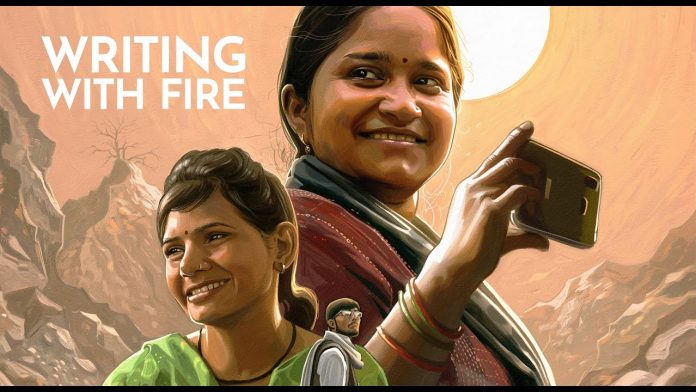
The documentary Writing With Fire narrates the story of gutsy women in India’s heartland.
Musheera Ashraf | TwoCircles.net
UTTAR PRADESH — Nominated for best documentary feature at this year’s Oscars and winner of the Audience Award and Special Jury Award at the 2021 Sundance Film Festival, the Indian documentary film Writing With Fire is a story of Dalit women journalists at Khabar Lahariya (News Wave) as it transitions from a print-only newspaper to a hybrid print and digital platform reporting on marginalized communities in India.
Khabar Lahariya is distributed in 600 villages of Uttar Pradesh and Bihar and has a readership of about 80,000 per week.
Launched in 2002 by the Nirantar Trust and co-founded by Kavita Devi from Uttar Pradesh, the paper, then a fortnightly publication, was run by a team of six women who wrote in Bundeli and Hindi. The paper with editions from Chitrakoot and Banda has been able to carve out a niche for itself over the past years by the efforts of Meera Devi, Bureau Cheif and her colleagues—a band of Dalit and Muslim women.
The film has garnered international fame and brought focus on the issues of media representation of women in India.
Calling it a watershed moment that could blaze the new trail of factual cinema in India, Rintu Thomas, one of the makers of Writing With Fire along with Sushmit Ghosh expresses her happiness for nomination for Oscar with The News Minute. Rintu and Sushmit were classmates during their Master’s course at the AJK Mass Communication Research Centre in Jamia Milia University, New Delhi.
The Oscar awards will be given out on March 27 at the famous Dolby Theater in Los Angeles, United States.
The movie follows three women, Meera, Suneeta, and Shyamkali, on the eve of Khabar Laharyia’s launch from print to digital. This transition is further complicated by the fact that many of the women journalists are not only illiterate but have never used a cell phone before. The women quickly master not only the learning curve of technology but the art of reporting, while also juggling the wifely demands of maintaining a traditional household. Meera’s husband struggles with her choice in the film, saying, “When there’s a man at home, how can a wife work?” Meera’s father astutely notes in the movie, “Everyone wants to marry an educated girl, but won’t let her work after marriage, so why marry her?”
The women who report the stories also edit, produce, distribute and market the newspaper. Meera Jatav is the Editor-in-Chief and has been working from Karwi (a place in Chitrakoot) since the newspaper was started. “I am so happy, but I can’t express it well,” Meera Devi told Reuters on the telephone, while she was reporting on the Uttar Pradesh elections.
Praise for the film
“The women’s grit in the face of palpable hostility is impressive, and it becomes more so when you learn that they’re in Uttar Pradesh, an Indian province known for crimes against women and that they are Dalits or members of the country’s so-called untouchable caste,” noted the film review in The New York Times.
Jason Rezaian of the Washington Post described the movie as, “The most inspiring journalism movie—maybe ever.”
The Chicago Reader described the documentary as capturing truly amazing moments of the journalists confronting intense story subjects and sometimes downright hostile situations, including one scene where the tenacious Meera confronts the local police department about neglecting a rape case.
Ghosh, the filmmaker remarks, “They have found their way to work within a system that’s designed to exclude them.”
In an interview with Vogue, talking about the systematic disparity prevalent in Indian journalism, Ghosh, the filmmaker said , “It’s important to remember that these writers are working in an industry dominated by upper-caste men and a space that is known for endemic levels of corruption as well as a culture of violence against women and Dalits.”
International Women’s Media Foundation described Khabar Lahariya as an “Independent, hyper-local news outlet, a feminist voice that disrupts and interrogates the status quo, where newsmakers have long been male, upper-caste, and politically connected.”
Musheera Ashraf is a special correspondent with TwoCircles.net. She tweets at @Musheera_Ashraf

